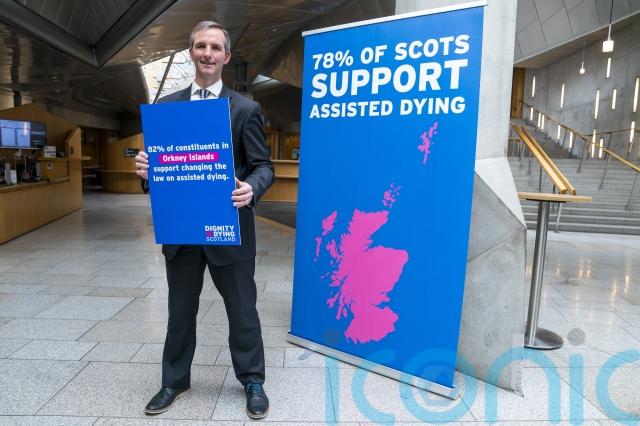
The head of a campaign group opposed to plans to legalise assisted dying has told a committee scrutinising the proposals that “no-one should be eligible”.
Responding to a call for evidence on the Assisted Dying for Terminally Ill Adults (Scotland) Bill, Dr Gordon Macdonald, chief executive officer of campaign group Care Not Killing Alliance (CNK), described the plan to legalise assisted dying as “uncontrollable”, “unethical” and “unnecessary”.
However, the MSP behind the Bill, Liam McArthur, said it is “extremely clear about the specific and limited circumstances it will give terminally-ill adults the choice they need”.
Dr Macdonald said medical professionals had a “duty to preserve life, not end it” and that many clinicians were opposed to the proposals, which he said would create ethical problems for staff, add to doctors’ workloads and undermine palliative care provision.
He also said the legislation risked leading to vulnerable people being coerced into assisted dying when they should be receiving better “care and support”.
He noted that in Ontario in Canada, where assisted dying is legal, the service “was accessed disproportionately by the most marginalised and economically deprived in society”.
He added: “In jurisdictions like Oregon (US), fear of being a burden is routinely cited as a reason for seeking assisted suicide (47.1% since 2001), more often than concerns over pain (28.8%).
“Professor Theo Boer, a Dutch former euthanasia regulator, addressed MSPs on the ‘dilemma of the choice’ in 2021: feeling pressure to ‘do the right thing.'”
Dr Macdonald also questioned the effectiveness of safeguards in the Bill designed to protect vulnerable people, which include the need for examination by two doctors, tests of capacity and coercion, and a period of reflection.
He said that not only were these measures in themselves flawed, but they could be “dispensed with entirely” if the law were to change in future.
Dr Macdonald summarised his objections in his written submission: “Uncontrollable: once the principle is accepted, it is subject to abuse and extension as lines are redrawn and so-called safeguards are dismantled. Any limit other than prohibition is arbitrary and ripe for challenge.

“Unethical: legalisation makes it a (cheap) treatment option to be routinely offered alongside others. Saying some suicides are to be prevented and others assisted necessarily undermines suicide prevention initiatives and devalues lives.
“Unnecessary: end-of-life suffering and constraints on living with dignity are often rooted in a lack of access to care and support.
“Sue Ryder estimates that up to 90% of people dying in the UK have palliative care needs (and the number of people requiring palliative care in Scotland is projected to increase by 14-20% by 2040).
“But less than 50% have access, driven by geographical, diagnostic and personal inequalities, with too many unable to access 24/7 support and too many reliant on financially vulnerable hospices.”
Dr Macdonald also raised concerns that the Bill, which would apply to terminally-ill adults over the age of 16 who had resided in Scotland for at least 12 months and were registered with a GP, would be used by young people seeking assisted dying.
He said that unlike comparable legislation in other jurisdictions, the Bill did not require consultation with the parents or guardians of people aged 16 or 17.

He added: “Belgium extended its euthanasia law to children of all ages in 2014 and Canada and the Netherlands have been preparing for similar extensions. The expansion being considered in Canada would apply to ‘mature minors’.
“This is how fast the debate shifts once the principle is accepted.”
Dr Macdonald was responding to the call for evidence by the Health, Social Care and Sport Committee concerning the Bill, which closed on Friday August 16.
CNK is a UK-based alliance of individuals and organisations that promotes more and better palliative care; works to ensure existing laws against euthanasia and assisted suicide are not weakened or repealed; and aims to influence the balance of public opinion against any further weakening of the law.
Since 2019, CNK has supported the development of Our Duty of Care, a network of healthcare professionals opposed to the legalisation of assisted suicide.
The palliative care and bereavement charity Sue Ryder, whose statistics were quoted by Dr Macdonald, added that it takes a neutral position on the issue of assisted dying but campaigns to ensure essential improvements to palliative care are made so that no-one faces death alone.
Liberal Democrat Mr McArthur said: “Our current laws on assisted dying are failing too many terminally-ill Scots, often leaving them facing an undignified and sometimes painful death despite the very best efforts of palliative care.
“I have spoken to many people across the country about the harrowing deaths they have witnessed and to dying people facing a series of desperate decisions such as trying to get to Switzerland or taking matters into their own hands. It is clear that a new compassionate and safe law is required.
“My Bill is extremely clear about the specific and limited circumstances it will give terminally-ill adults the choice they need. Under the terms of my Bill, an individual would only be eligible to access the choice of an assisted death if they had an advanced, progressive terminal illness and capacity to make the decision.
“This Bill puts much-needed compassion and safety in place, it is similar to laws which have been safely and successfully introduced in countries such as Australia, New Zealand and the United States which enjoy strong public support.
“Polling suggests strong support exists for a change in the law but as parliament begins its scrutiny of my Bill, I will continue to engage with charities, organisations and my fellow MSPs to understand their perspectives on this important issue.”
Subscribe or register today to discover more from DonegalLive.ie
Buy the e-paper of the Donegal Democrat, Donegal People's Press, Donegal Post and Inish Times here for instant access to Donegal's premier news titles.
Keep up with the latest news from Donegal with our daily newsletter featuring the most important stories of the day delivered to your inbox every evening at 5pm.